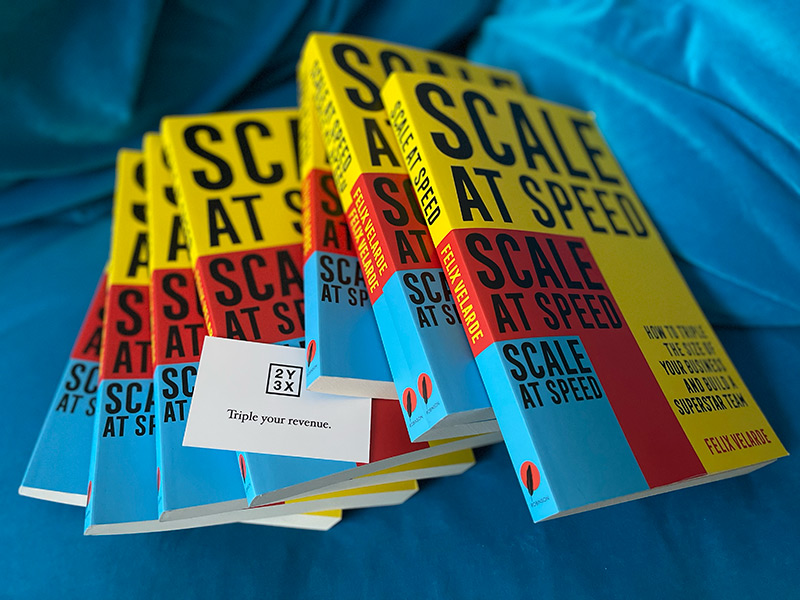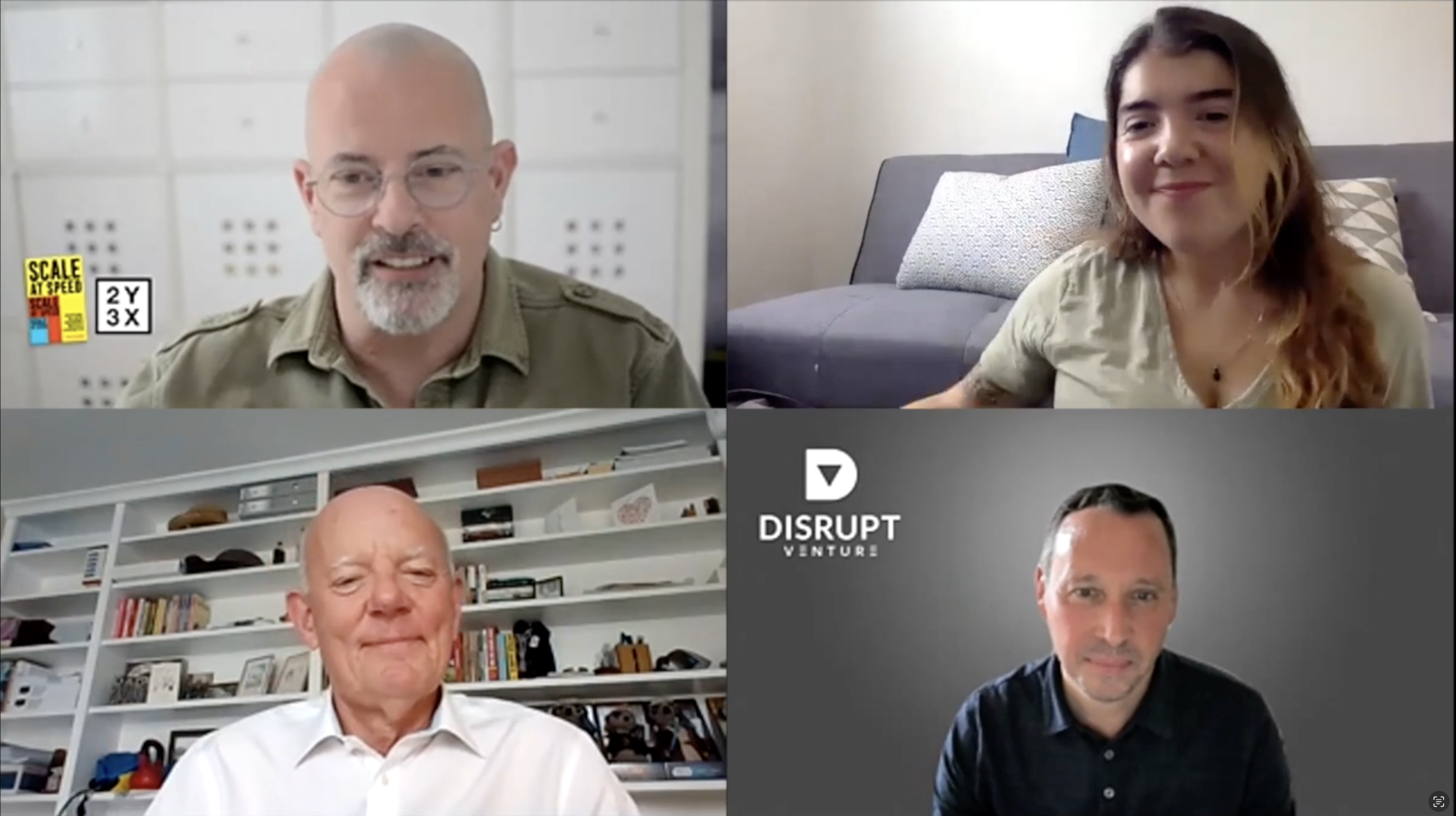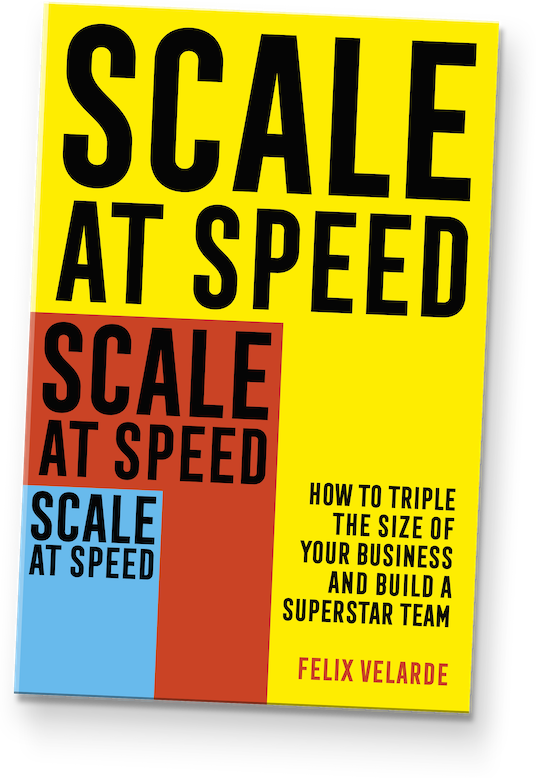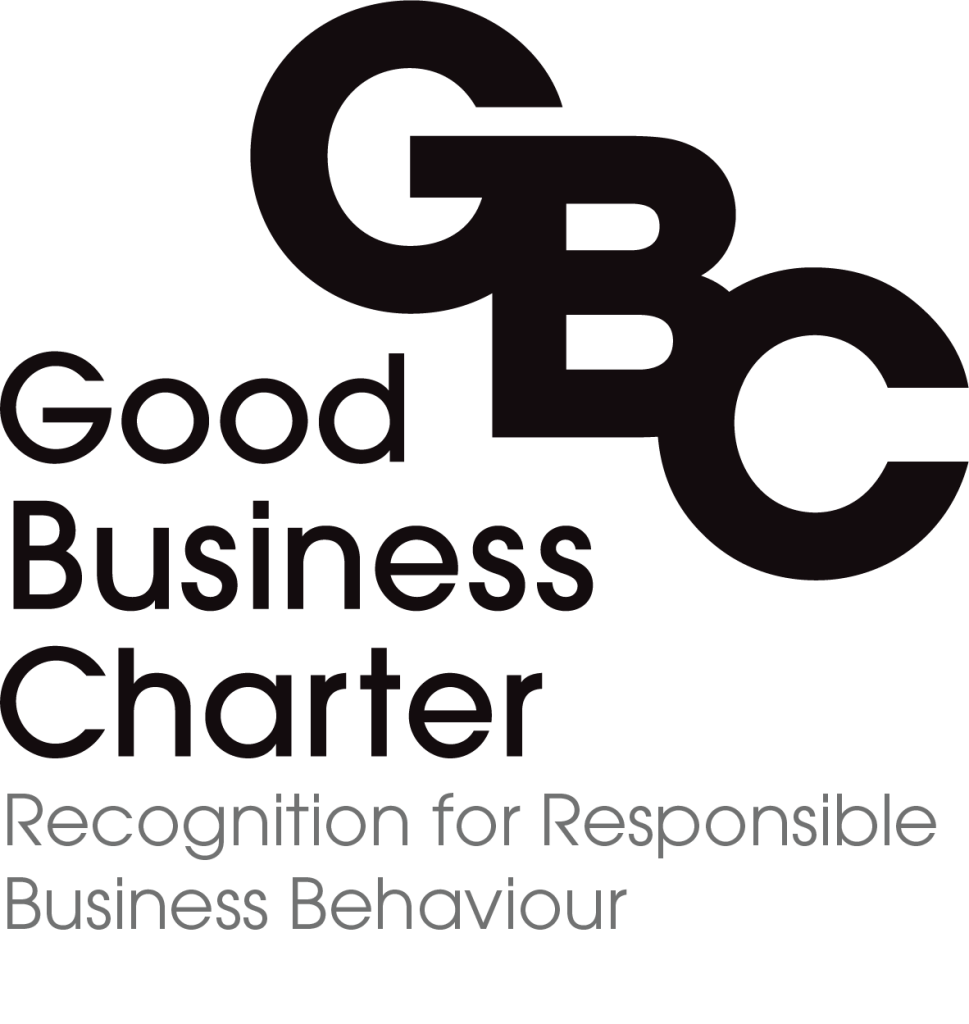How to grow fast
Transcript: How to grow your company fast
You can listen to this podcast, which lasts 35 minutes, here.
- Introduction
- What kind of agencies do you work with?
- What are the triggers that make agency owners come to you?
- How do you triple an agency’s revenue?
- How does the Strategy Map and the Roadmap work?
- Small steps lead to big change
- What does an external advisor do?
- How do agencies generate leads?
- Agency pitch doctoring
- Top three tips for agency leaders
- The seven most important words for a CEO
- Competitive differentiation and agency propositions
- Felix Velarde’s book recommendations
Introduction
Recorded voice: Welcome to Small Spark Theory. This podcast is designed as a collection of thoughts, ideas and practical tips on using marginal gains to help your agency new business endeavors. Small Spark Theory is hosted and created by Lucy Mann, founder of Gunpowder Consulting. Based on over 25 years of new business practice, Gunpowder’s mission is to help agencies take control of the new business process, create effective marketing plans and provide tools to measure success. For more information, please visit gunpowderconsulting.co.uk.
Lucy Mann: Welcome back to Small Spark Theory. I’m delighted to have with me here today Felix Velarde. Welcome, Felix.
Felix Velarde: Hello.
Lucy: Felix was introduced to me through a mutual colleague a couple of years ago. We chatted about new business and about consulting. In preparation for today, I’ve just been reading through Felix’s bio and it’s one of those CVs that makes you wonder what on Earth you’ve been doing with your life. For those of you that haven’t come across Felix before he started one of the first web design companies, Hyperinteractive. He’s adjunct professor at Hult International Business school on the MBA and master’s program.
He’s working with the Internet’s co-inventor, Vint Cerf. He’s consultant, non-exec director and chairman of a number of agencies in London and LA and is consulting and mentoring agency leaders. When he’s not doing all of that, he’s also a glider pilot and a Burner but most importantly Felix tell us about being a Burner?
Felix: Burning Man is my passion and I’ve kind of redesigned my life around being able to have as much fun as I possibly can. Each year, I go and take part in Burning Man. I’m part of the theme camp that gives away 10 grand’s worth of cocktails during the week and is epic fun. I’m already planning this year’s trip, which will happen at the end of August.
Lucy: Sorry, £10,000 worth of cocktails?
Felix: $10,000 worth of cocktails and it’s fun.
Lucy: Okay. Just going to think about that a moment.
Felix: Imagine the chaos, that’s exactly what it’s like.
Lucy: Well, cocktails aside, one of the reasons that I wanted to get you to come and talk to us on Small Spark Theory is I saw your talk at The Drum New Business Conference, Brief Encounters, in November last year. One of the things that struck me was that you were using a really smart technique for planning. One of the things that I’ve noticed over the past few years working with agencies is getting them to use planning effectively.
Certainly, in terms of marketing a new business planning or growth planning in my experience it tends to be a bit haphazard or they’ll go to the other extreme and put together a plan that’s really involved, quite complex and then just gets forgotten or it takes too long and everybody gets a bit disillusioned and a bit bored with the whole process. The techniques that you were using struck me as being really workable and an easy way or relatively easy way for agencies to quickly be able to pull something together and start to make some progress.
I’m really, really interested for us to explore that a little bit today but it’d be really useful for the listeners if you could just give us a little bit of background on the Felix story so far.
Felix: Well I started my first agency in 1994, more or less by accident and largely because I was completely unemployable. The Internet – the World Wide Web – had grabbed my attention. I had a great business partner and we started one of the first web design companies as you said, Hyperinteractive. A couple of years later, I started an agency called Head New Media and that became the Digital arm of Lowe (which is MullenLowe now).
I’ve had a series of relatively first-in-market agencies in online PR and interactive television and kind of invented eCRM by borrowing CRM from Mei Lin Fung, who co-invented it at Oracle. I’ve had six agencies all in. I’ve run The Conversation Group which was a collection of 12 agencies. Then about two and a half years ago, so the end of 1994, I decided that I’d done my time, I’d done 20 years of running agencies and agency groups and I wanted to end that career.
I sold my last agency and got into consulting and chairing agencies, and putting into place development plans, essentially, taking an agency that had potential but wasn’t realizing it, and turning it around and giving the founders and owners clear direction and clear, competitive differentiation and helping them grow. I’ve been very fortunate over the last couple of years. I now have eight agencies, which I’m non-executive director of.
What kind of agencies do you work with?
I’ve got a few clients here in London and in Los Angeles that I consult with. I’ve just started a new practice of helping people set up agencies and position them for growth, putting in place growth strategies but through new business and through differentiation and through alignment, which are the three biggest problems that we always get. So far, touch wood, every single one of the agencies that I’ve worked with has grown at least one and a half times over the last 12 months. Yes, it’s fun. It’s great fun.
Lucy: That’s amazing results. That’s great results.
Felix: The common factor actually is, if I’m really brutal, the common factor is, any plan is better than no plan. I’ve had a career as a strategist in digital and a career at finding clear, blue water for agencies and making certain that they are very highly differentiated from the rest of the market. I think if you add three things: one is, a plan with a process for achieving the plan; competitive differentiation, so clear, blue water between where you sit and what the rest of the market does; and total alignment internally. If you get those three things right, more or less, you can only outperform the market. That’s what I spend my time doing. That’s what I’ve spent the last couple of years doing, and it works.
What are the triggers that make agency owners come to you?
Lucy: You talk about the agencies that come to you for help. What are the usual triggers for them to think, “Actually, we need someone like Felix on board”?
Felix: There are two. Most recently, obviously, the new practice of setting up agencies and helping define the proposition and creating the plan for them. That’s people who are really, really ambitious and they want to start and they’re not really sure where to start. I think most agencies start because they have a client and they don’t want to pass. I think if you plan it rationally, it gives you a flying start. That’s interesting. The rest of them, largely, if they can see that there’s an opportunity to go for a high-value exit, say being valued at £10 or £12 million to the shareholders on exit in, say, three years’ time.
They don’t really know how to get there, and they’ve been stagnating for the last three, four, or five years. I think most agencies go through the boom and bust and feast and famine cycles just because they don’t have a steady plan where every single person in the organisation knows which way they’re going and knows that it’s just about turning the handle on machine. I think if you create that machine in an easy enough way and a clear enough way, you can inculcate that. You can make that process part of the culture, get people aligned, and head all of you in the right direction.
I guess it’s people who are frustrated that they’re not quite getting the offers that they want to get, and really want to make more out of it. My specialty is taking companies through two or three of the standard ceilings that happen at 1, 2, 5, and 10 million turnover and getting them through that, through great process. To some extent, I’ve done it so many times, I’ve probably made every single mistake that you can make. In the way that Steve Jobs articulated beautifully, and I, therefore, can’t: “You can only really join the dots up if you look in reverse.” I’ve been there several times. It’s very easy for me to join up the dots that lead to what works and the high value.
Lucy: I read a really lovely quote a couple weeks ago. I think it might have been Eleanor Roosevelt that said, “Learn from other people’s mistakes. You’ll never live long enough to make them all on your own,” which is obviously quite nice.
Felix: It’s true.
How do you triple revenue?
Lucy: You talked about some really impressive results over the last 12 months. Is there a stand out case study?
Felix: Yes. I’ve got one client who is truly a no-limits thinker. He’s amazing, and I love that kind of client. He’s the sort of client, he says, “I know that we’re turning over nothing now, but why shouldn’t we be turning over 20 million quid?” I love those kinds of people because they’re the easiest to help. We did some exercises on competitive differentiation and making them stand out from the market. We set some very, very tough goals, three-year goals, and one of the goals was to get to a million and a half profit at the end of the third year from basically a standing start.
Once you set a goal like that, it forces you to say, “Can I do that just by increasing 10% or 20% a year?” Answer, no. He said, “How do you do that?” One of the answers that we came up with, for him, was, “Well, we need to do some acquisitions.” He’s increased his turnover by just over 3.1 times in the last 12 months. He’s an amazing guy, we spend a lot of time training his team, working on sales process, working on lead generation strategies that are just rock-solid, long-term plans.
I think they hyper-focus on what they say they do, which means that every single client who wants what they say they do has to come to him. All the people who want to work in that particular niche want to come and work with him and then he is driven by really big ambitious goals and he doesn’t see any reason why he shouldn’t be able to attain them. Yes, he’s a dream client. That’s why I think he’s the top performing client this year, although most of them actually have doubled or tripled their net profit this year.
How does the Strategy Map work?
Lucy: Can you talk us through the Strategy Map?
Felix: There’s a set of principles, there’s a whole bunch of them. When you’re the CEO of an agency or any other company,there are a whole bunch of books that seem to be the mandatory reads. One of them is Jim Collins’s amazing book Good to Great, and he talks about several principles, and then there’s another book called the Rockefeller Habits which has been updated very recently to Rockefeller Habits 2.0, it’s called Scaling Up by a guy called Verne Harnish, which is my number two recommendation for mandatory reading for anybody who wants to grow a business.
He talks about a series of different documents and different alignments and ways of encapsulating data. Now, I’m a simplistic guy so I like things that are simple enough to put on a single sheet of paper and are a simple enough for me to understand and also for the people that I work with and their team. There’s a process called ‘Strategy Map’ which essentially starts with a three-year goal with a couple of metrics, say your metrics are a million and a half profit in three years time, ready for exit.
It works backwards from those goals towards today. Tesco calls it man in the high mountain; picture yourself on the high mountain having achieved all of your goals. Now, look back down at the mountain and work out how you got to where you are. The roadmap works in a similar way. In year three, you need to have done a million and a half profit and you need to be ready for exit.
Taking those things, if you think about people, if you are to be ready for exit then you need a team that is running your business so that you can sell, concentrate on the sales process and also so that you can leave. In year three, you need a senior management team that is rock-solid, that is perfectly running the business. Working backwards from that in year two, you need a senior management team that is coming together, that’s starting to learn how to run the business, that needs training.
That way you need to identify who the right people are on it and the wrong people on it and who’s most effective, what resources they need. Then, working backwards again to this year, you need to identify who’s going to be on that team, you might need to recruit a few people, you might need to train a few people, incorporate your company’s values and make sure that it’s totally embedded in that team. For every single thing that leads towards your goal, you need to take your goal and work backwards.
Small steps
Lucy: Break it down.
Felix: Break it down into small steps. You can do things like identifying superstars today and start assembling a senior management team. Then, you can identify what training they need, that might be next quarter’s activity. That applies across the whole business, in three years’ time, you will need 12 retained clients generating £120,000 or £130,000 of net profit each. Working backward to the second year, you need to turn all of your clients into retained clients and find new clients who will replace the one or two that you’ll lose over the coming year or so… you need a rock-solid client services team.
Working backwards again to today, you need to be able to identify which clients are profitable, which clients you love working with and are passionate about, which ones are likely to be transformable into retained clients. You need to identify the client services team and train them and put in place the processes that will support them. You’ll need to start using timesheets, for example, because without that you can’t identify which clients are profitable and which aren’t, which people are effective, which people aren’t.
Again, the sales process. In year three, you’ll need to be finding three really big clients; in year two, you’ll need to find five big clients and four smaller clients. You’ll need a great sales process that’s perfectly predictable. In year one, you need to develop a lead generation strategy that will stand you in good stead for the next five years or three years. That lead generation strategy, you need to work down to granular numbers.
How many people do we need to attend an event each month? What’s the process? How many emails do we need to send to get the right person to come to the event? How do you design the event and so on. It’s breaking what seems like lofty goals down into granular actions that you can take and execute today.
Lucy: I worked with a CEO who was forensic about that kind of planning and it makes an enormous difference to the teams in a business when there are those plans in place, and that have been broken down on a more granular level and knowing that the plan that you have today is the same plan that you had last week and it is the same plan that you’ve got next week. It’s really empowering because as an individual or as a team and as a board of business, you know exactly what you’re being measured against. Of course, you’ll get some curve balls coming up now and again but you can just regroup back to the knitting as they say.
What does the external advisor do?
Felix: Day-to-day gets in the way sometimes, my role is to be an external person who comes in and says, “Okay, so Sally, how did you do against the task that you’ve got to deliver this quarter over and above your day job, of creating an HR strategy for example?” or: “Johnny, how’s the referrals program being going in terms of the set up with that,” and knowing that next month they’ll then start having to test it.
That’s a really interesting role for me. I think one of the great things about it is, when you put together the first senior management team, most people really want to plan. They really want to see that the company knows where it’s going. Not only is it good for alignment and for letting the senior management team know what the long term, and medium term, and short term goals are so they know what they’ve got to do and what they’ve got to deliver and what they’ve got to delegate to their own people.
I’ve actually used the Delivery Roadmap extremely well during recruitment. If you are competing for the best planner in the business, or a great creative, or a great production person, or a fantastic office manager. One of the things that will make you stand out is saying, “This is our plan.” Rather than just saying, “Here’s a job description, these are the 50 things that you’ve got to do in your role,”it’s “These are our goals, we’re going to allow you to make your own decisions as to how you’re going to help us reach those goals. We’re hiring you against the values of the company and the goals that we’ve set, not against some turgid job description where actually you then start competing against everybody else on the level playing field. I’m a great believer in not having a level playing field.
Lucy: It feels like they’re being invited to join the journey.
Felix: Completely – and with alignment comes achievement.
How do agencies generate leads?
Working forwards for a second, once you’ve got your competitive differentiation or competitive advantage, once you understand what your stand out clear blue water positioning is, then you can start working out what kinds of clients you want and need. We talked earlier about the need for twelve retained clients in year three and what you might need to do in year two in order to get that. Starting off with lead generation, working backward works really, really well.
If we know that we’ve got to win ten clients a year, then that’s quite a tall order. We can break it down into really, really simple steps. If your pitch to win rate is one in three, for example, which is the standard, reasonably good pitch to win rate. Unless you’ve had really good sales training yourself, you could expect a pitch to win rate of one in three. You also know that for each pitch you probably need ten qualified leads, to get every single win, you need 3 times 10, which is 30 leads.
If you want 10 wins a year, that’s 300 leads a year. Now, new business broadly speaking comes one third through referrals, one third through inbound where you’re not really sure what caused it (you are doing some PR, you are in the league tables and so on, writing good articles that generates inbound), and one third that comes from specific outbound activities, courses or events.
You know that you need to generate a hundred referrals a year, in order to stack up the right number of leads to be able to win the right number of pitches. That allows you to say, “Okay, well, that’s 10 a month, eight a month, we’ve got 8 clients so we need one referral from each of those a month. We need 10 qualified leads a month from outbound. We need to put together an event or attend an event or do a show or whatever the activity is that generates us 10 qualified leads.
The qualified lead is somebody who wants what you do, has the ability to make the decision and wants it now. Those are the only three criteria for a qualified lead. If they don’t meet any of those three, they’re not qualified lead, they’re a prospect for some time in the future. It sort of tells you what you’ve got to do. By working backwards from your 10 wins a year, you need to get 30 leads a month from three different sources. It’s just about breaking it down into tasks that are small enough to be doable without being scary and without having to put 18 people on it.
In my own experience, having some great in-house salesperson is never going to be as effective as you the CEO being passionate about what you do, and being able to show off the work that you do. Generally speaking, what you need is somebody externally who can identify the leads, because it’s not the pitches that you want to get to sort out. It’s the right people who’ve got the budget now, and who want what you do. It’s just about breaking down the processes.
If you get 10 wins a year, that’s a million pounds of revenue already. If you’re winning hundred-grand clients – and you should be, because a hundred-grand client is only 10 grand a month. None of it is rocket science, none of it is really too difficult. I think the beauty of the Roadmap is actually it’s all common sense.
Lucy: The lovely thing about looking at the numbers that way is that over time, if you track and measure your performance against those numbers, you can start to factor in how you’re performing. You can see actually next year. We know that referrals perform really, really well. We can adjust our targets accordingly, whereas the inbound thing doesn’t deliver quite the same. Either we need to turn that up a little bit, or make compensation for it elsewhere.
Pitch doctoring
Felix: You’re looking at a series of dials. For example, I’ve got one client who had been stagnating at about the million turnover mark, but their lead generation process was really good, so we spent some time putting it together at the beginning of the year. About halfway through the year, we realized that there was a blockage, and they were only winning about one in four pitches. Looking back at all of the different component of their new business strategy, the pitch itself became the thing that was keeping them at a relatively stable but not growing level.
We spent a day putting the top teams through a pitch doctoring process. It was great fun, we had this great day together. I showed them a methodology for winning a pitch in a consulting way, so that you end up selling value rather than having to quibble about whether your hourly rate is £88 versus the industry average of £90, or whatever. If you can sell value, then that makes it so much easier, much more profitable. We spent this day doing this, training them in this pitch process and the first time out – they had a pitch two weeks later – they won a half-million-pound piece of business, by breaking down and measuring all of the components of a new business process. It makes it very easy to identify where things need fixing, or tweaking, or upgrading, so really successful. We wouldn’t have been able to do that if they hadn’t worked all the numbers back, watched it flow for about six months, and then identified where the problems were.
Lucy: The key there is measuring the activity as well as the results, because if you’re just focusing on the results, you’ve got no idea what you need to change about the activity.
Felix: Completely. Also the danger of focusing on the results, going all the way back to the beginning of this conversation, is feast and famine. What tends to happen is we say, “We’ve got too many pitches on. We can’t do any new business meetings because we’re all too busy doing these pitches.” Then you wonder why you haven’t got any pitches in three months’ time, because you haven’t got a machine that you turn the handle on. You need to be doing all of the things steadily all the time. Otherwise, you get this pilot-induced oscillation and chaos and sometimes unfortunately, failure.
Top three tips for agency leaders
Lucy: What would be your top three tips for any of our listeners today?
Felix: It’s really difficult to get down to three. The first is to understand your company’s values. The values have to reflect your own values. What I mean by that is, if you are prone to shading the truth, having integrity is one of your values, it won’t wash. Understanding your values, whether those values are entrepreneurialism, or craftsmanship, or integrity, or always being forthright, being humble or whatever they are, understand the values. Three or four values are probably sufficient for any company. Values are really interesting because they become your hiring and your firing tool. You do not hire somebody who does not meet every single one of your values.
If anybody on your team stops displaying any of your values, fire them. That’s number one: values are the most important foundation for a coherent business that in itself has integrity. Second is: get the right people on the bus. If you have anybody who is low performer, who is really difficult, who does not conform to your values, does not reflect the way that you want your company to be, who is not excellent, get rid of them, replace them with somebody who’s excellent. There’s an old adage, “A players hire A players. B players hire C players.”
You do not want to be a company filled with B and C players. If you’re an A player, only hire people who are better at it than you are. Getting the right people on the bus, really important. Hire slowly, fire quickly.
Lucy: Can I just ask you on that? Because I found that, that can be a real problem with senior leaders not hiring people who have potential to be better than them.
Felix: I think it’s mandatory. Hire people who are better at it than you are and get on with it. I’ve spent my entire career… to be fair, it’s very easy for me to hire those people who are much better at it than I am. My best advice is, get out of the way of the people who are superstars and only hire superstars. Why would you not want to have any superstars on your team? They should all be superstars.
The seven most important words for a CEO
Lucy: That’s the thing, isn’t it? Hiring superstars but then getting out the way and letting them do their thing?
Felix: Absolutely, delegation. My top, top tip for any manager, in fact, any CEO, the seven most important words for a CEO, “I don’t know, what do you think?” It empowers people to make decisions themselves, to come to you with solutions. Let them come to you with solutions. None of them, if they get it wrong, is going to break your company. Just let them get on with it. They’ll learn and we’ll become better, and the more they come to you and say, “We had a problem, I solved it.” The more you can focus on your strategy. You asked me for three top tips, I have a third and fourth, I’m afraid.
Competitive differentiation and agency propositions
Lucy: Okay, go for it.
Felix: The third is, obsessive repetition of your company’s positioning. Understand why you’re different to your competitors in the eyes of your customers, what it is that you are passionate about, what you can be the best in the world at, and then bang that drum for the next three or five years obsessively. You have to repeat it over and over again to your staff, to your clients, to the market, to the people who you bump into at a party. If you can’t describe what you do and why in a short, plain English sentence, then stop what you’re doing, work out how to do that, and then get back on the road.
Every single person who works for you wants to be able to say to all of their friends, “We are the world’s best X, and maybe we are the world’s most entrepreneurial creatives. We are the world’s greatest craftspeople operating in the Travel and Leisure sector.” Whatever it is, find something that you can be the best at, and then repeat it obsessively. That will colour the way that you train people, that will colour the way that you recruit people and eventually you will be the best at those on whatever it is.
I do have a fourth: if you really want to grow, every CEO needs a mentor. I really needed one, I didn’t have one for the first 10 years, and everything I did was chaos. Then I started learning. I would say this, wouldn’t I? Because this is my career. Find a great non-exec or a great Chairman who can come in, help you devise the plan and then come in once a month to hold your feet to the flames. That will get you progress, consistent, steady, drip, drip progress towards an amazing goal.
Lucy: What’s the best piece of advice that you’ve ever been given?
Felix: I once subscribed to Harvard Business Review. They used to send you a red book at the beginning of your subscription, and it gave you 10 top tips in business. Then the first piece of advice was, “Don’t let somebody coming to you for advice put their monkey on your back.” What that really meant was, everybody who reports to you will come to you because you’re the boss, you’re the person with the vision, you’re the person who’s got the expertise, you set it up, and they don’t want to get it wrong. They’ll come to you and say, “Boss, I’ve got this problem. How do you want me to solve it?”
If you can train yourself to say, “I don’t know, what do you think?” Eventually, they’ll start coming to you and saying, “Boss, I’ve got this challenge or this problem. I’ve got two different solutions I think might work. Which one do you think will work best?” “I don’t know. What do you think?” is the best come back to that. They would have thought about it and they will say, “Well, I think option A.” Your job then is to say, “Great, try it. Report back to me in a week or tell me when it’s finished and tell me whether it succeeded or failed.”
There’s no shame in failure. The more you fail, the more you learn and the quicker we as a business will learn how to do it properly. That single piece of advice of delegate responsibility, don’t just delegate by handing people tasks. If you delegate by responsibility, they’ll start re-delegating responsibilities. Actually, then you get a really high performing team and you won’t get problems coming to you apart from the mission-critical ones, and that will release you to work on the business rather than in the business.
Felix Velarde’s book recommendations
Lucy: You mentioned earlier, you mentioned a couple of books that you recommend. One of which you said was your second all-time favorite business book. I’m going to ask you for the first all-time favorite business book that you would recommend to our listeners.
Felix: Okay. Well, number two is Scaling Up by Verne Harnish which is rich and dense. If you follow all of that advice, you will make heaps of value in your company and yourself millions. It will be great. It is very complex book. What I do and what the Delivery Roadmap is, is a simplified version of all of the advice in that book but it’s a fantastic read. My all-time favorite business book is called The Four Obsessions of an Extraordinary Executive and is by Patrick Lencioni.
He’s written a couple of amazing books about management. It’s a parable. It’s about how to coach and how to manage people. It’s centered around obsessive repetition of the company’s mantras and creating a culture of coaching and learning. One thing I’ve discovered, managing and running agencies, it used to be awful that when somebody comes up to you and says, “Boss, have you got five minutes.” It’s that moment of dread. .
Everybody leaves. I discovered that actually everybody leaves. Actually, to be fair, I’ve left five or six times. Every single person in the company will leave.
Once you get your head around that, if you can coach your people, if you can get them coaching their people, what happens is that you get constant improvement. I’d rather have somebody who was constantly improving and only worked for me two years – a superstar – before being poached or going on to their next career move than having somebody who was studying and wasn’t improving and stayed with me for three, four or five years. I think that’s really important.
What eventually happens, that I learned a long time ago, is that people start wanting to come and join your company because they know that they will be forced, there’ll be forced growth, they’ll learn loads and they’ll become really excellent, and they’ll get high wages when they leave. I advise, always train your people, train them really, really well. Train them fast and hard and make that part of your culture because you’ll attract the best and brightest superstars.
Lucy: Felix, that has been really enlightening. Thank you so much for coming and sharing your knowledge and experience with us. It’s been absolute pleasure.
Felix: Thank you.
Lucy: It’s competition time. We have a copy of one of the books that Felix recommended, The Four Obsessions of an Extraordinary Executive by Patrick Lencioni, which we’re going to be giving away to a lucky listener. If you want to join in the conversation on Twitter using the #smallsparktheory, we will pick a winner and send a copy of this book over to you in the post. Tune in again next month when I’ll be talking to Alex Sibille and Dan Sudron from the Future Factory.
Recorded voice: You have been listening to Small Spark Theory, a podcast by Gunpowder Consulting. Music is provided by Jukedeck available via jukedeck.com. Small Spark Theory is hosted by Lucy Mann. The editor is Isabelle Jarvis. The podcast is produced by Rosanna Miles at makemypodcast.space. Visit gunpowderconsulting.com for more information and visit our blog there to download further podcasts.
Join the conversation on Twitter at gunpowder tweets #smallsparktheory. If you like what you hear, head to iTunes and give us a star or five. Thanks for listening.
More posts
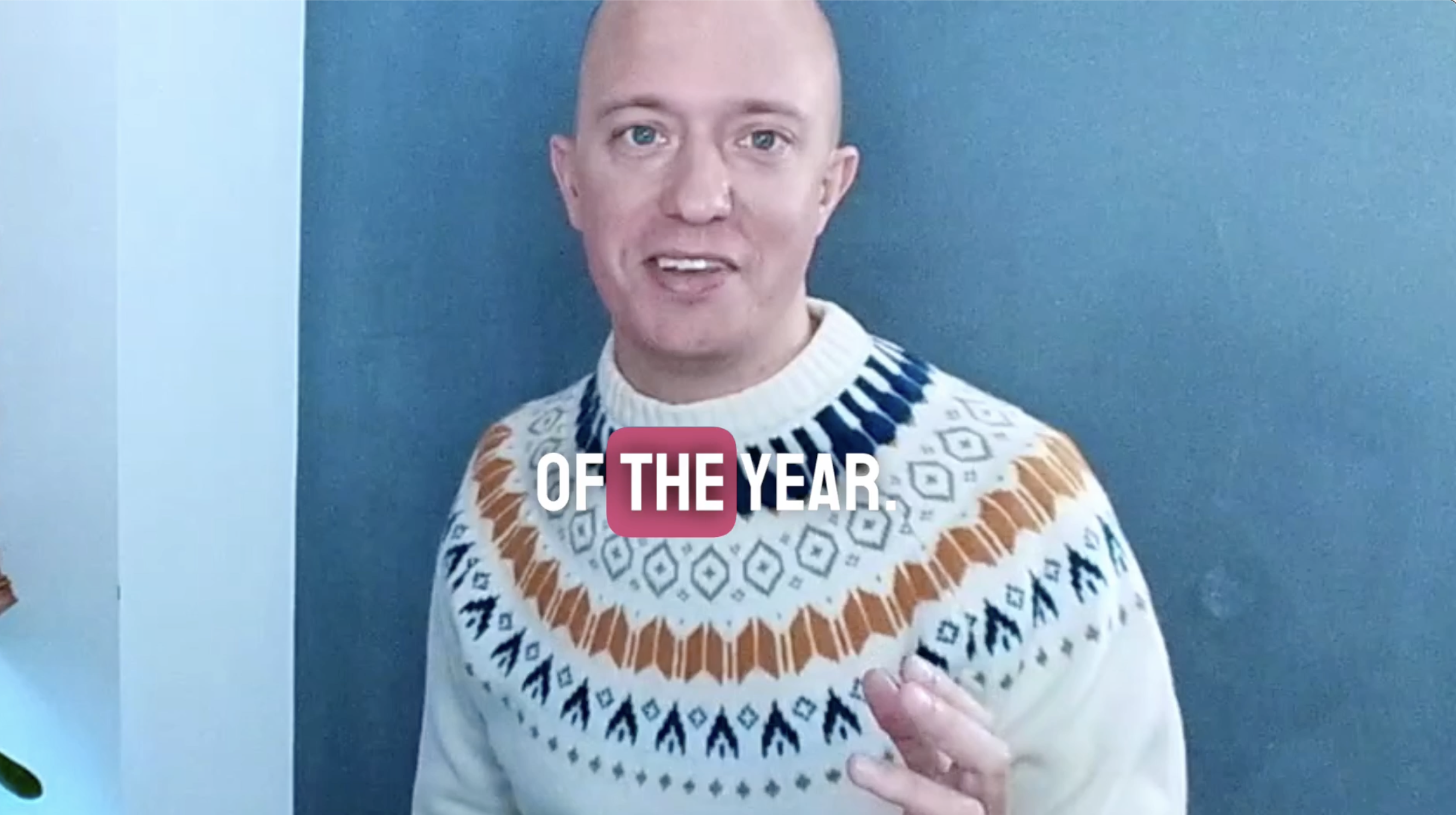
Scale at Speed review

How the strategy map works
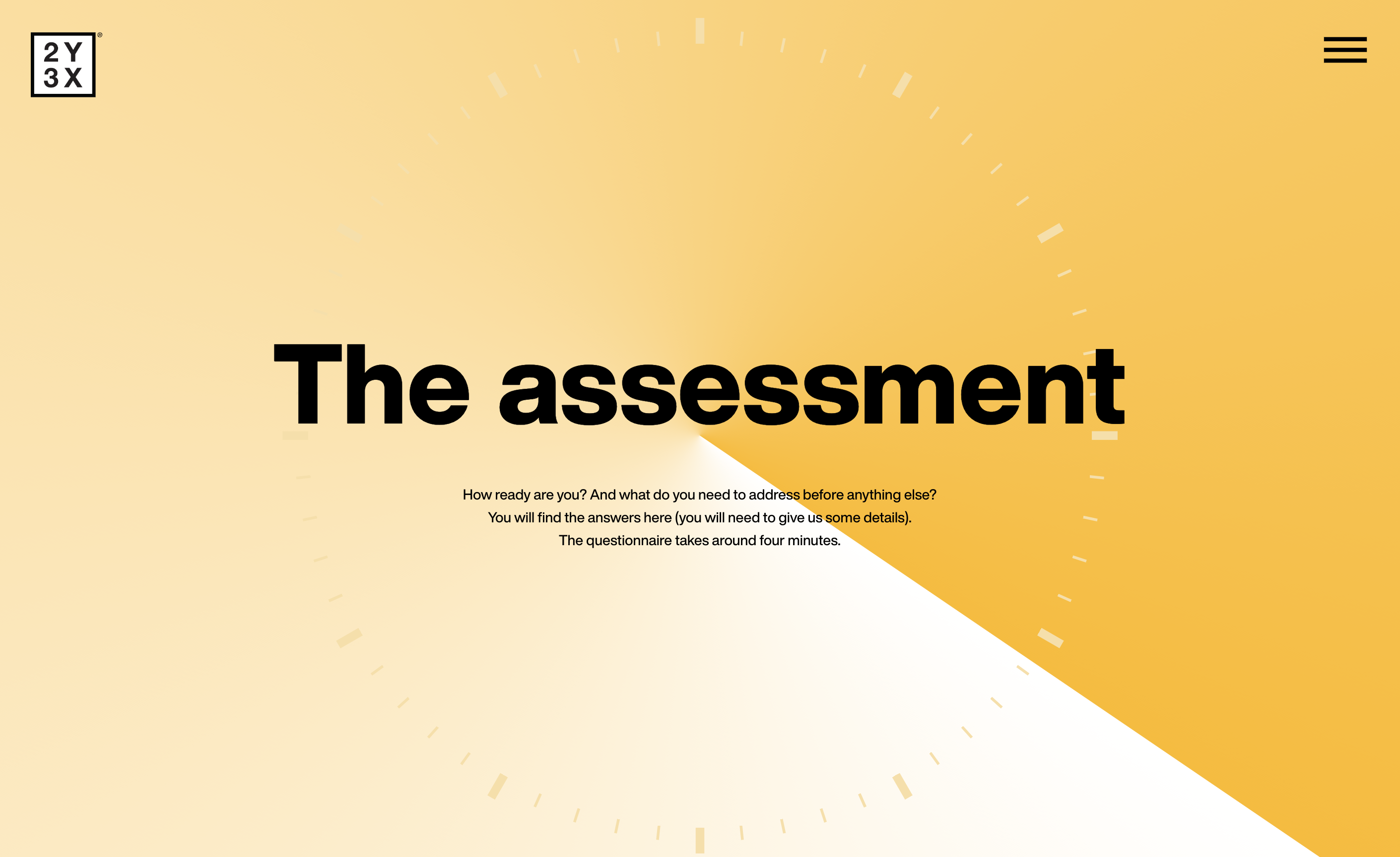
2Y3X scorecard published
